Asia Justice and Rights (AJAR) and civil society organisations from South-East Asia gathered at Escola Secundaria Técnica Vocacional-Grupo de Tecnologia e Indústria (ESTV-GTI) Becora, Timor Leste, from 19-21 September 2024 for the annual ASEAN Civil Society Conference/ASEAN People’s Forum. The event, themed “Toward A People-Led Democracy and Sovereignty in Southeast Asia,” brought together a diverse range of participants to discuss pressing issues across the region. AJAR, as a member of the Regional Drafting Committee, representing the country-based National Organizing Committee from Indonesia and Timor Leste, organised three workshops and a photo exhibition alongside its partners.
Over the course of the three intensive days, participants raised their collective voices through four plenary sessions, 24 workshops across six convergence spaces, and 25 side-events, addressing critical topics in six convergence spaces including State Violence, Militarism, National Liberation and Democracy; Tech Monopoly, Digital Authoritarianism and Internet Freedom; Ecological Crisis, Environmental Rights, Agrarian and Urban Issues; Minority, Marginal People and Gender Justice; Peace Building, Human Security and Transitional Justice; and Working People, Neoliberalism and Alternative Regionalism.
Solidarity for Accountability in South East Asia
AJAR provides further insight into the topic of gender justice and state responsibility through the event’s convergence space by holding two workshops. The first one titled Truth and Reparations for Survivors of Sexual Violence: Lessons Learned from Timor-Leste And Relevance to ASEAN Countries, this workshop aims to share the emerging lessons and challenges from Timor Leste with ASEAN civil society groups faced with a similar context where widespread sexual violence is taking place during conflict.
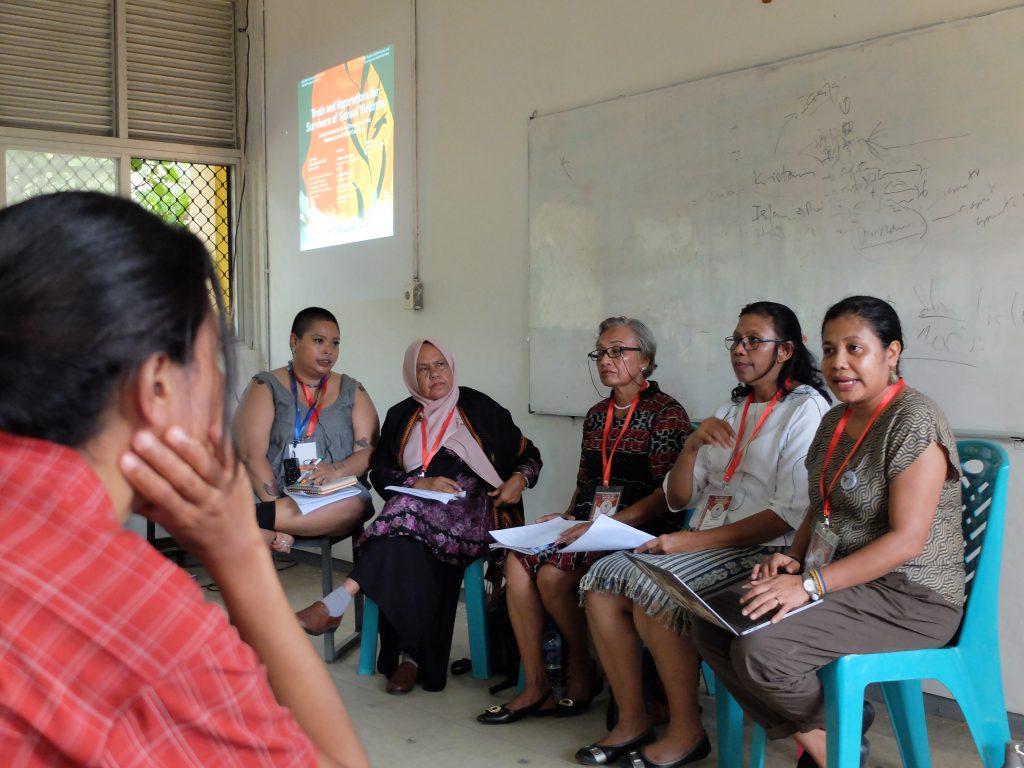
Moderated by Jovie from AJAR Timor Leste, the session featured Manuela Pereira from Associacaun Chega Ba Ita (ACbit) Timor Leste, Isabela from Pirilampu (Women Survivor Group) Timor Leste, Farida Haryani from Paska Aceh, Indonesia, and Kania Mamonto from AJAR Indonesia. Speaking to 39 people, The speakers discussed the situation and existing obligations to provide remedies for victims of conflict-related sexual violence within ASEAN, examining the main principles, participatory, and grassroots approaches being developed to empower survivors of sexual violence in Timor-Leste. They also explored how these lessons could be relevant to other contexts and discussed steps ASEAN member states can take to strengthen victims’ rights to truth and reparations.
“The needs of survivors today have changed because of the long history of sexual violations. Many still suffer from health problems that were never treated, and new health issues have emerged. Survivors also face mental health struggles and are often excluded from their families and communities. The state has not given enough recognition to their suffering, which has led to poverty being passed down through generations.” Manuella shared their Participatory Action Research findings with the survivors community. Isabela shared how after 25 years of independence, there are still many women victims and survivors who have not received their rights to justice, truth and reparation, and even face new violations, describing the situation as darkness. “However, from all this darkness, I hope that one day there will be a bright spot. This small light first appeared from ACbit and Ajar when they approached us to talk about their experiences through Participatory Action Research. After we were brave enough to talk to others, we carried out activities that could bring together fellow survivors from several cities in Timor-Leste. Now we have a forum called PIRILAMPU. PIRILAMPU comes from the name of a small animal or torch that symbolizes a small light in the darkness. We compare ourselves to a small light in the darkness, but if we unite, that small light will become a big light, and our voices will unite and become strong.” Isabela coordinated Pirilampu with the support of local NGOs like ACBIT and AJAR, it is now have organize 455 women are survivors of sexual violence, who are currently advocating for the government to fulfill its obligations to provide reparations and recognition to the most vulnerable women.
Not too different from Timor Leste, Farida from Paska Aceh also shared their struggle to help fulfill the rights of victims in Aceh, especially now after the non judicial mechanism made by the government which lacked participation from the survivors. “At Rumoh Geudong torture site in Aceh, most of survivors were not being included in any non-judicial initiatives set by the Government of Indonesia, particularly in the reparations and memorialisation program. With the lack of consultation process with the survivors, the reparation program at the end failed to meet victims rights.” she explained. Kania from AJAR emphasised meaningful participation from survivors in every transitional justice mechanism is the heart of the movement towards justice for survivors.
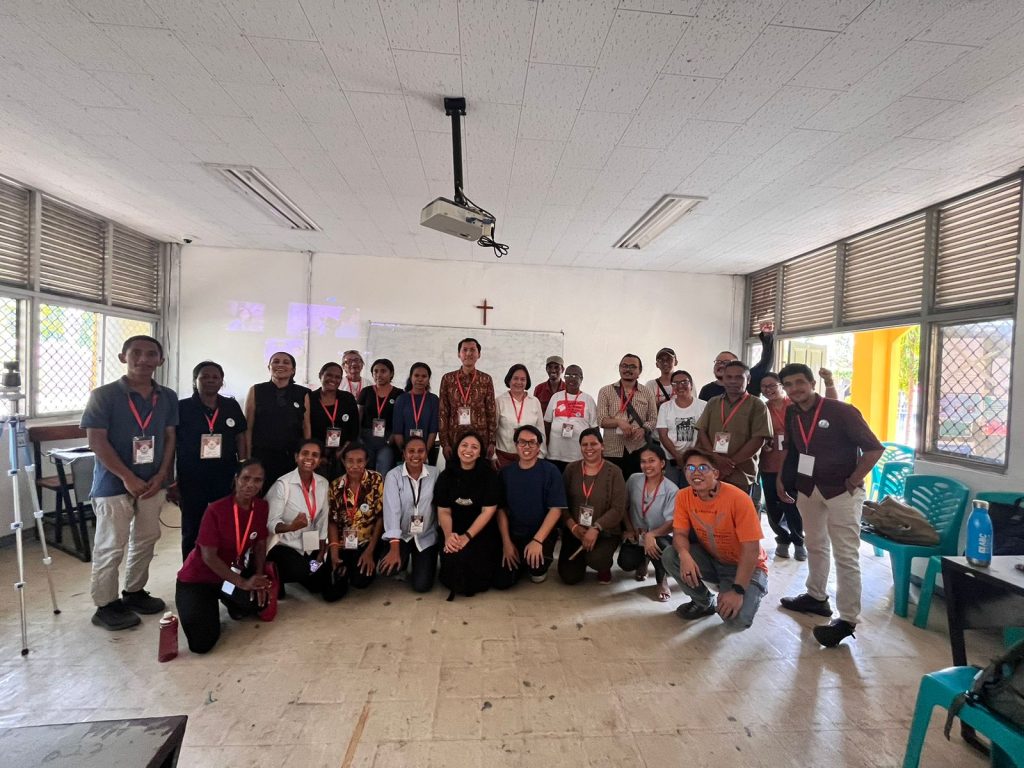
AJAR’s second workshop, in collaboration with Forum Asia and TIFA Foundation, discussed “Initiatives for Human Rights Defenders and Environmental Human Rights Defenders Protection in Southeast Asia”on 20 September 2024 of the event, under the thematic Convergence Space 2: State Violence, Militarism, National Liberation, and Democracy. Inocencio de Jesus Xavier from AJAR Timor Leste shared insights into the challenges facing human rights defenders in Timor Leste, highlighting both the progress made and the ongoing struggles. Hanung from Forum Asia, and Zico from TIFA Foundation were also present as speakers. The discussion was moderated by Putri Kanesia from AJAR Regional, who facilitated an engaging conversation on the protection mechanisms needed to safeguard these defenders. Around 35 people participated in the discussion.
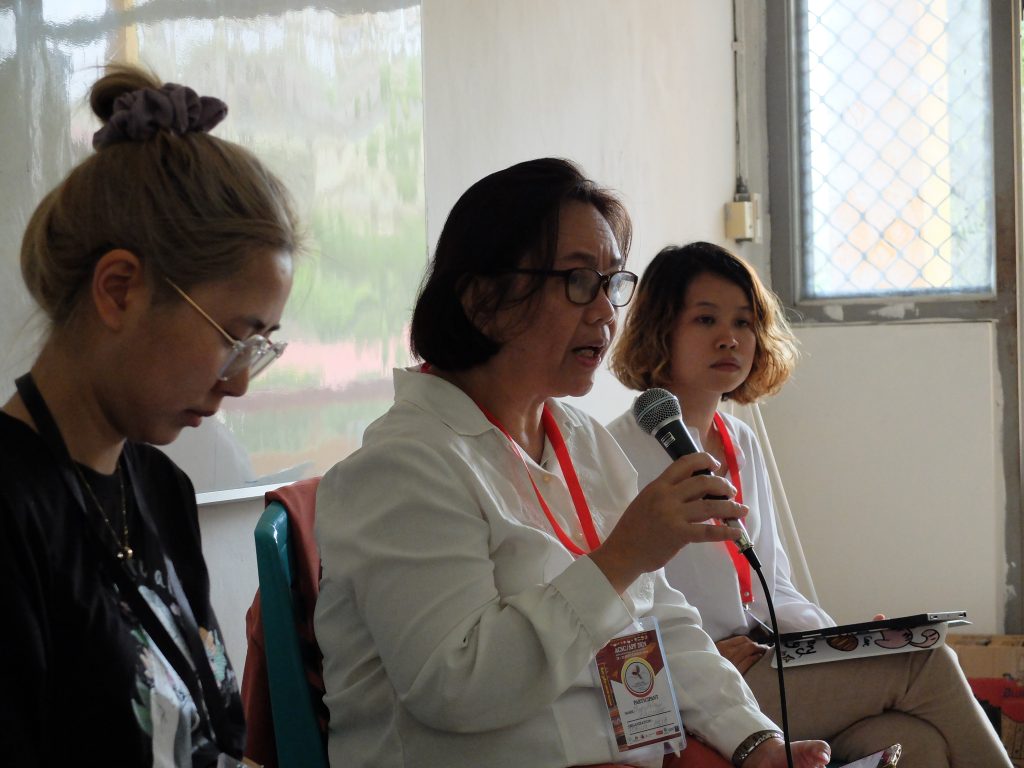
The last workshop, collaborating with Forum Asia, Cross Cultural Foundation (CrCF) Thailand, “Balancing Sovereignty and Responsibility: Rethinking ASEAN’s Non-Interference Principle in the Face of Humanitarian Crises and Human Rights Challenges”, focusing on the impact of non-interference on ASEAN’s response to crises in ASEAN, the balance between sovereignty and human rights, and potential reforms for enhanced regional cooperation that uphold human rights values. The session was well-attended with over 36 participants. Moderated by Prakaidao Phurksakasemsuk from Cross Cultural Foundation, the speakers are Mary Aileen Bacalso from Forum Asia, Alarie and Amalia Suri from AJAR. From the sessions, It was agreed that the ASEAN Charter needs to be reviewed, especially for the Non Interference and Consensus principle. It should be rethought in the midst of the humanitarian crisis in ASEAN.
Amalia Suri reflected how the ASEAN Non Interference and Consensus Principles which initially aims to protect ASEAN member state sovereignty especially after colonialism and cold war struggle, is now often being used by ASEAN Leaders to avoid or hinder their efforts to uphold universal democracy and human rights values in the region. “ASEAN has remained inactive during major humanitarian crises, including in Myanmar, Papua, Pattani, Cambodia, and Thailand, failing to address threats to democracy and human rights. Despite its ‘people-oriented’ motto, ASEAN has not provided civil society with mechanisms to seek justice or advocate effectively, leaving many without recourse after exhausting domestic legal processes. The ‘ASEAN Way’ prioritises the interests of member states’ leaders, focusing on preserving power rather than addressing public concerns with responsibility and accountability. This has widened the gap between ASEAN’s principles and the realities on the ground, as inter-governmental bodies often work against civil society in their fight for democracy and human rights. Even ASEAN human rights bodies, like AICHR and ACWC, are hindered by the non-interference and consensus principles entrenched in the ASEAN Way.”
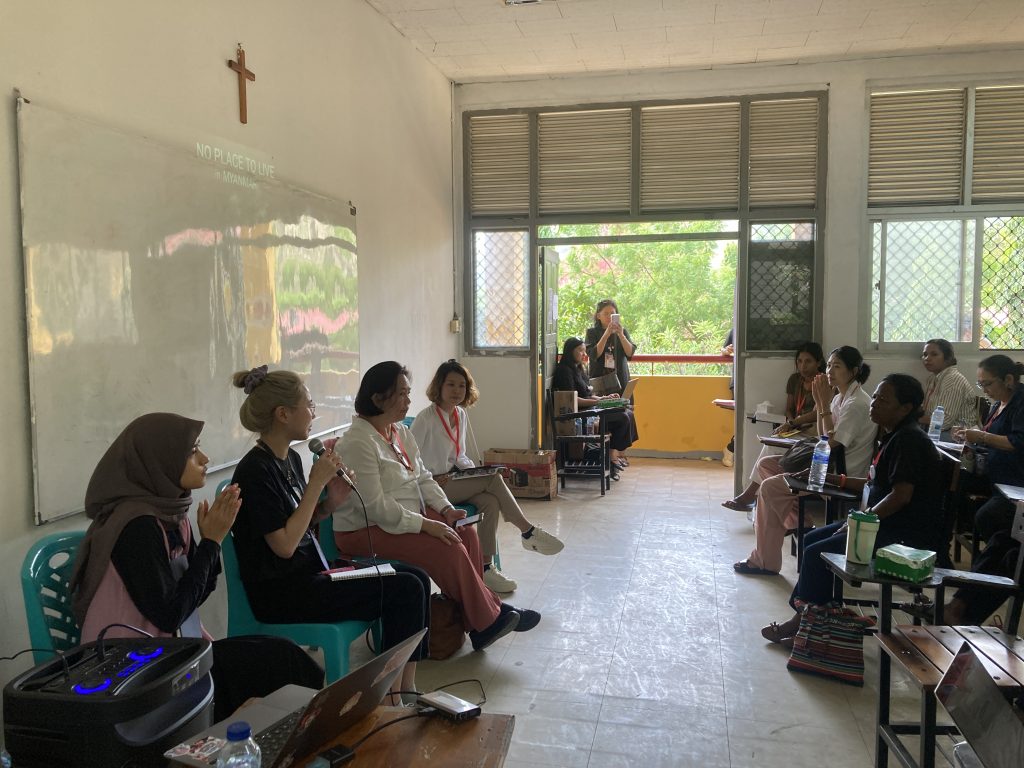
Mary Aileen Bacalso supported the notion, stating how in ASEAN, the principle of non-interference is often used as a convenient excuse to avoid addressing human rights issues or delay the process of it. “Examples of how the progress within the ASEAN Intergovernmental Commission on Human Rights (AICHR) is slow, where it requires significant effort to influence the process and mainstream critical issues. For instance, it took AICHR 10 years to institutionalise its communication/complaint mechanism, which now allows the body to receive complaints related to human rights violations.”
Alarie added with the current situation of Myanmar and the Rohingya crisis. She stated how ASEAN’s adherence to the non-interference principle – had a significant impact on the international response to the crisis in Myanmar, by slowing down meaningful actions and allowing the military junta to shield itself from external pressure. The aftermath of the 2021 coup led ASEAN to develop the Five-Point Consensus, which didn’t call for strong actions or consequences for the military’s actions,even when the junta did not comply with the consensus. Alarie also mentioned that After three years of inaction, hopes for ASEAN to resolve the crisis have faded. “We no longer expect anything from ASEAN. We had high hopes, but after three years, nothing has changed. Still, people recognize that ASEAN is one of the most important steps we need to take. That’s why we must keep pushing ASEAN forward.” She hopes that ASEAN could go beyond the ineffective Five-Point Consensus. ASEAN should act as a Humanitarian Corridor, ensuring aid reaches those in need without interference from the military junta. “ASEAN should cooperate with other actors and international stakeholders, including the NUG and ethnic groups, to ensure aid reaches all affected areas, including regions controlled by ethnic and revolutionary forces.” she concluded.
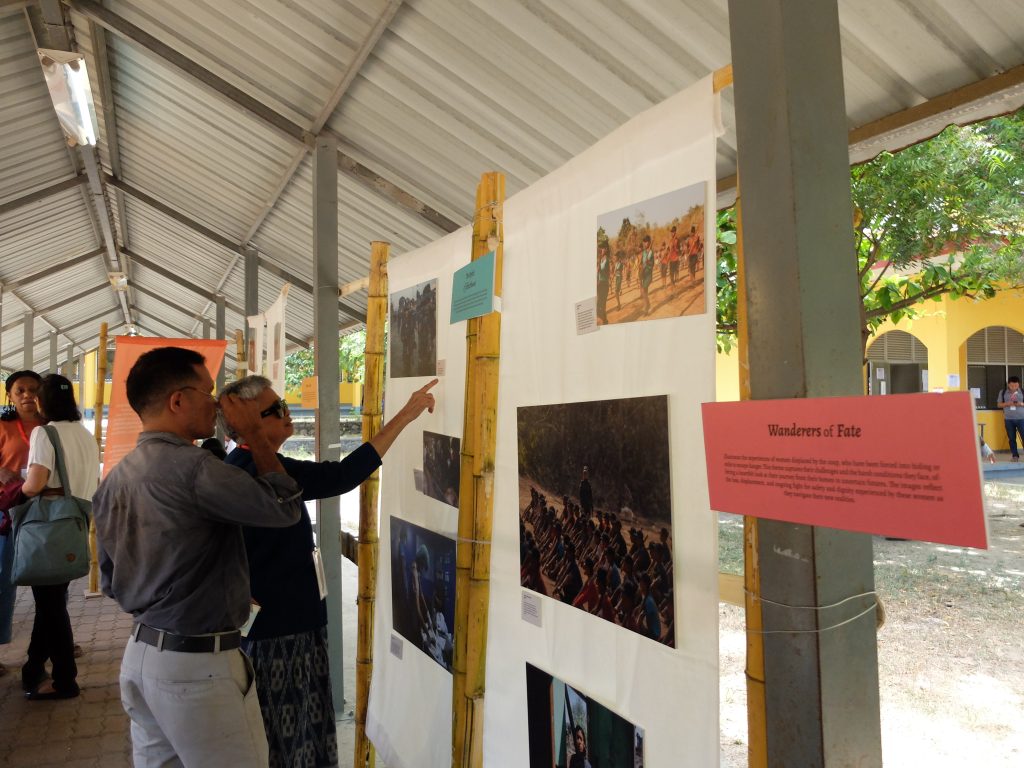
In Solidarity with the situation in Myanmar, AJAR also organised a photo exhibition. The photo exhibition, titled “Still We Rise: The Women of Myanmar”, featured powerful images that capture the unbeatable spirit and crucial contributions of Myanmar’s women during a time of immense struggle. Following the attempted coup on February 1st, 2021, which abruptly halted a decade of progress in women’s political activism and participation, this exhibition sheds light on their incredible resilience and bravery. Through four meaningful themes, the exhibition showcases the essential roles women have played in the ongoing struggle for democracy and peace. As part of the Women, Peace, and Security (WPS) initiative, the exhibition aims to bring these voices to the forefront and emphasise the importance of supporting women in leadership and peacebuilding amidst the crisis. The collection of 20 images curated by a diverse group of talented photographers provides a narrative of courage, resilience, resistance, and hope. AJAR believes that the audience would be able to engage with the stories of Myanmar’s women who continue to fight for justice and equality in a disrupted landscape. This exhibition is a call for action and solidarity, encouraging support from ASEAN and beyond, and recognition and action on the urgent issues facing women in Myanmar.
The exhibition captured the attention of 198 people who are also participants of the ASEAN Peoples Forum. Visitors were visibly moved by the stories behind each image. “These are very powerful photos, beautiful and breathtaking at the same time. It is good that AJAR can show this exhibition to keep people in solidarity with Myanmar, starting from women’s pictures” said someone from LAO.
The final day of the ASEAN Civil Society Conference/ASEAN People’s Forum 2024, held on 21 September, focused on the The drafting committee presented the recommendations gathered from each convergence space, synthesising insights from across the conference. These recommendations aim to guide future civil society initiatives and influence policymaking at both the regional and national levels. The committee confirmed that the collective recommendations will be brought to the upcoming ASEAN Summit, where they will be presented to political leaders in the region. This crucial step ensures that the voices of the people, as articulated during the forum, will be part of the discussions at the highest levels of ASEAN leadership.